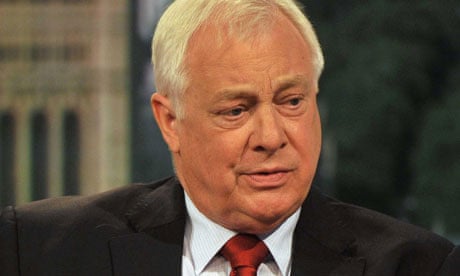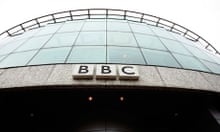The BBC Trust chairman, Lord Patten, said he would ban bonuses and perks for senior management and cut the pay of the next director general to below the £668,300 earned by the incumbent, Mark Thompson.
In his first public speech since becoming chairman, Patten tried to draw a line under a long-running "toxic" row which has seen the corporation frequently criticised for the amount of licence-fee payers' money it spends on its top executives. He said "no executive board member will get a bonus in future". The BBC executive board has seven executive (including Thompson), and five non-executive, members.
The former Tory cabinet minister said on Wednesday the BBC would be the first organisation to publish a "pay multiple so the public can see exactly how the pay of those at the top of the BBC compares to the rest of the organisation". He went on: "And when the time comes – I hope no time soon – to appoint the next director general, I would expect to adopt the same approach as for other executives and secure the right candidate at a lower multiple."
The move is likely to prove popular with BBC rank-and-file staff, who feel the issue of top salaries has polluted perception of the corporation. Patten said: "This action on pay is important. Because the BBC must do right by the licence-fee payers who pick up the bill and by all the staff that work throughout the organisation at every level."
Addressing the Royal Television Society, Patten said he wanted to be more open about how much top executives earn by incorporating economist Will Hutton's review on public sector pay which said that no executive should receive more than 20 times the salary of the lowest paid.
He also promised the number of senior managers at the corporation would be reduced from 3% of the workforce to around 1% by 2015 and their private health insurance would be phased out.
The issue of executive pay and bonuses has dogged the BBC for the past few years. To try to stem anger from politicians and BBC staff facing cuts, Thompson has never taken his bonus and since January 2009 all key executives have waived their bonuses and frozen their pay. Earlier this year they also gave up a month's salary.
Separately, in an interview in the New Statesman to be published on Thursday, Thompson appeared to suggest the BBC had the issue in hand, noting that "pay has come down significantly".
He went on: "The BBC is trying to straddle the reality of finding people with what the public expects of public-sector pay. You will see more movement in the months to come."
Patten in his remarks made it clear he believed "there is further to go – both in making further reductions and securing public confidence". He argued the publicly funded BBC "needs to distance itself" from the commercial market, explaining: "Public trust suffers whenever there is evidence of corporate behaviour that doesn't fit the ideal."
Following criticism about the convoluted BBC complaints procedure in a Lords communications committee report, Patten announced the creation of a chief complaints editor.
He also said that "the trust should be more clearly focused on its role as a strategic governing body" and that the BBC "needs to provide a service to digitally literate 20-year-olds just as much to old-fashioned newspaper-reading 70-year-olds".
Patten said he does not want BBC commercial arm BBC Worldwide privatised but says he wants it to "work more closely with other UK broadcasters and producers".
To contact the MediaGuardian news desk email editor@mediatheguardian.com or phone 020 3353 3857. For all other inquiries please call the main Guardian switchboard on 020 3353 2000. If you are writing a comment for publication, please mark clearly "for publication".





Comments (…)
Sign in or create your Guardian account to join the discussion